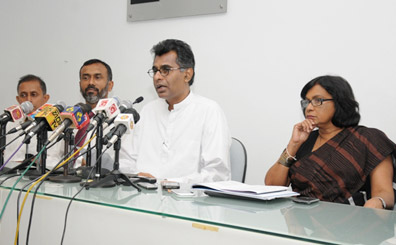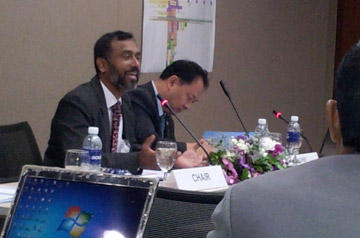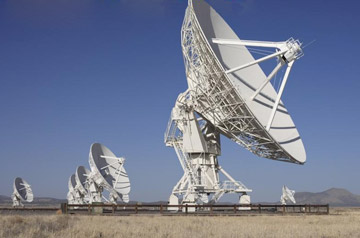Space technology for sustainable development
By Dhaneshi Yatawara
|

Technology and Research Development Minister Patali Champika
Ranawaka explaining the new initiative to the media last week
|
The use of space technology applications in many developing countries
such as Sri Lanka, has not matured," said Engineer Sanath Panawennage,
Director General of the Arthur C Clarke Institute for ModernTechnologies
(ACCIMT) .
It was in such a back drop that Sri Lanka was selected by the United
Nations Economic and Social Commission for Asia and the Pacific
(UNESCAP) as the first pilot country to implement a five year Action
Plan (2012-2017) in capacity building in the region to use space
technology applications for sustainable development.
The aim of the five- year action plan drafted by UNESCAP is to help
the countries in the region to assist build their capacity for thev use
of space technology applications for sustainable development, including
disaster risk reduction. The ACCIMT works as the national focal point
for space technology applications as appointed by the UNESCAP. "It is a
privilege to be selected as the first country as there are 53 countries
in the region as full member states and nine other countries as
associate members that are yet to receive this chance," said
Panawennage.
In today's context space technology is every day technology. Rain,
drought, building cities and irrigation canals, animal movements and
hundred and more predictions depend so much on branches of space
technology. Space technology is not only building and launching
satellites, according to scientists.
"Space technology is not rocket science," said Panawennage.
explaining the new phase of technological advancement Sri Lanka will
enter in the near future.
 |
| Director
General Sanath Panawennage |
 |
| In today's
context space technology is every day technology |
Agriculture, irrigation, natural resources management, environmental
management, oceanography, urban development, land use management,
disaster risk reduction, transportation, climate change adaptation and
many more fields can be brought to an advanced and more efficient level
with the use of space technology.
Space technologies such as Remote Sensing by Earth Observation
Satellites, Satellite Communication Applications and the associated
geographic information systems and such ensemble of technologies are
increasingly finding wide spread applications across diverse array of
spheres, as Panawennage said . Amidst this advancement happening far and
wide across the globe, Sri Lanka was struggling to bring in a spec of it
to accelerate development.
"This is popular in the world specially in countries with space
technology. It improves efficiency and productivity in many areas.
Established in its present corporate form as a Statutory Board by the
Science and Technology Development Act No. 11 of 1994, the ACCIMT is
operating within the purview of the Ministry of Technology and Research.
The institute conducts research in information and communications
technology, electronics, microelectronics, space technology, robotics
and photonics. Most of the research is aimed at promoting latest
technology among government and the private sector industries in Sri
Lanka.
The above selection by the UNESCAP was at the 17th Session of the
Intergovernmental Consultative Committee (ICC) of the Regional Space
Application Program (RESAP) of the UNESCAP and the High Level Decision
Makers Meeting on implementation of the Asia Pacific Plan of Action for
Applications of Space Technologies, which were held back to back at the
United Nations Conference Centre in Bangkok during November.
The ACCIMT, is functioning as the National Focal Point in Sri Lanka
for Space Technology Applications for the Regional Space Applications
Program and Sanath Panawennage, Director General of the ACCIMT was
elected to the Chair of the above High Level Decision Makers Meeting.
The ACCIMT represented Sri Lanka previously as Vice Chairman, Chairman
and Vice Chairman posts of the ICC during sessions in 2010/2011,
2011/2012 and 2012/2013.
"We were in the need to develop this field so that we could develop
many fields and have food safety and better economic development. Yet as
many countries without space technology Sri Lanka also faced many
drawbacks in development," he said. For example, India has an impressive
drought monitoring system developed with their satellites which plays a
key role in safe guarding the agriculture sector. "If we get the chance
to develop such a system in Sri Lanka it would ensure food security of
the country," he said.
Under the UNESCAP program data will be collected from satellites of
countries like China and India and will be disseminated to the
development of agriculture, irrigation and disaster management.
"Technology and expertise will be available through this program. Our
Scientists will get the chance to train themselves in esteemed
organisations - all funded by UNESCAP," Panawennage said.
Are we going to develop a totally indigenously manufactured
satellite? Through this program it seems that it is highly possible. We
are not targeting the moon yet a small step at a time in this line of
scientific advancement. " At the moment we can not think of
manufacturing many satellites for all the purposes we need. Even in the
world only three or four countries have that capability," he added. But
we need a few number of satellites to gather vital information we need
and the rest has to be
sourced through other satellites belonging to other countries," he
said. " Satellites vary. Whether it is small or big we need the same
level of technology and expertise. Thus to suit our need of information
we are talking about building a small satellite," according to
Panawennage.
Launching satellites is a different story that needs a specific place
and any country which wish to develop space technology need to seek
assistance of those specific places.
First things first. Our Scientists need to get the basics right.
"Though we have experts in technology, demonstrations need to take place
to refresh and educate the science community on this technology,"
Panawennage said.
While the satellite building process continues takes time the ACCIMT
will go ahead in collecting data, knowledge transfer in developing Space
technology. We have to gather information from existing satellites yet
under this program this will be streamlined further to assist a broader
spectrum. |

